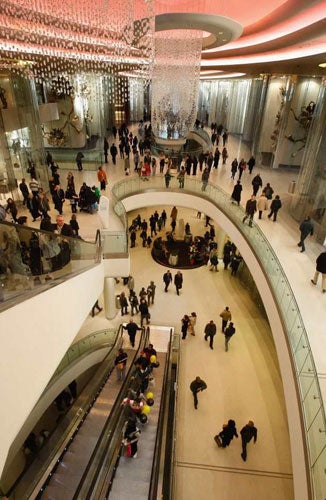It was our national pastime – but now shopping is just so over
Bank of England says love affair with retail is at an end

Your support helps us to tell the story
From reproductive rights to climate change to Big Tech, The Independent is on the ground when the story is developing. Whether it's investigating the financials of Elon Musk's pro-Trump PAC or producing our latest documentary, 'The A Word', which shines a light on the American women fighting for reproductive rights, we know how important it is to parse out the facts from the messaging.
At such a critical moment in US history, we need reporters on the ground. Your donation allows us to keep sending journalists to speak to both sides of the story.
The Independent is trusted by Americans across the entire political spectrum. And unlike many other quality news outlets, we choose not to lock Americans out of our reporting and analysis with paywalls. We believe quality journalism should be available to everyone, paid for by those who can afford it.
Your support makes all the difference.For a time it seemed that walking the shopping malls was more popular than walking the dog, but in a dramatic change for a nation of credit card junkies, the Bank of England has declared that Britons are going off shopping as a "leisure activity".
As the Bank announced the end of shopping as a national pastime, high street giants were announcing marketing ploys in attempts to turn back the clock to the free-spending days in the lucrative run-up to Christmas.
Marks & Spencer is cutting the price of all its clothing and wine by 20 per cent today, following similar hit-and-run price-cutting at Debenhams. The American fashion giant Gap is reducing its clothes by 30 per cent for staff "family and friends", while the off-licence chain Threshers is offering 40 per cent discounts.
Many other retailers are expected to slash prices in the coming weeks and M&S, the country's biggest clothes retailer, said it would not rule out further daily discounts amid a "volatile and highly-competitive environment".
Evidence of the turnaround in shopping habits – from extravagance to frugality – is clear, says the Bank of England. Instead of lavishing money on big money items such as televisions and sofas, shoppers have turned into bargain hunters and are scouring discount stores and factory outlets.
Its summary of business conditions for this month, released yesterday, states: "More generally, discretionary spending was seen to be shrinking, with retailers reporting that fewer consumers were treating shopping as a leisure activity – reflected in reductions in both impulse spending and visitor numbers at shopping centres."
Pundits agreed that for a significant number of Britons the days of enjoying a spot of retail therapy seem to be over – for now. Retail sales fell for the first time in three years last month, down 0.1 per cent, but the number of shoppers fell 3 per cent year-on-year in October, according to the research company Synovate.
"My belief is that there are some fundamental changes afoot in shopping behaviour among different groups of society," said Synovate's Dr Tim Denison.
"It is not just the case that we are shopping less often, spending less on non-essentials, switching more to own-label basics and moving allegiances from middle-market to value chains.
"For some people, shopping is not the enjoyable social pastime it was hitherto. It has become more of a frustration, where their eyes and hearts alight upon goods that have now become unaffordable to them."
A third of adults have cut spending by an average of £160 per month – taking a total of £2.7 billion a month out of the tills, according to the Post Office today.
Almost three quarters (71 per cent) of shoppers are concerned that their finances will be devastated by the downturn.
The retail analyst Freddie George said the M&S sale was a clear sign that sales were "well behind budget". He warned that shoppers were holding out in the hope of better bargains in days to come, adding: "Christmas 2008 has the feel of being the worst retailing Christmas for many years."
Some shops are refusing to engage in promotions, though. "Other companies might slash their prices by 20 per cent one week and put them up the next, but as we will always match any price we will always offer a good deal," said Patrick Lewis, John Lewis's director of retail operations. Next said: "We are not having any sales before Christmas as it would hurt our margins." Bah, humbug!
Join our commenting forum
Join thought-provoking conversations, follow other Independent readers and see their replies
Comments